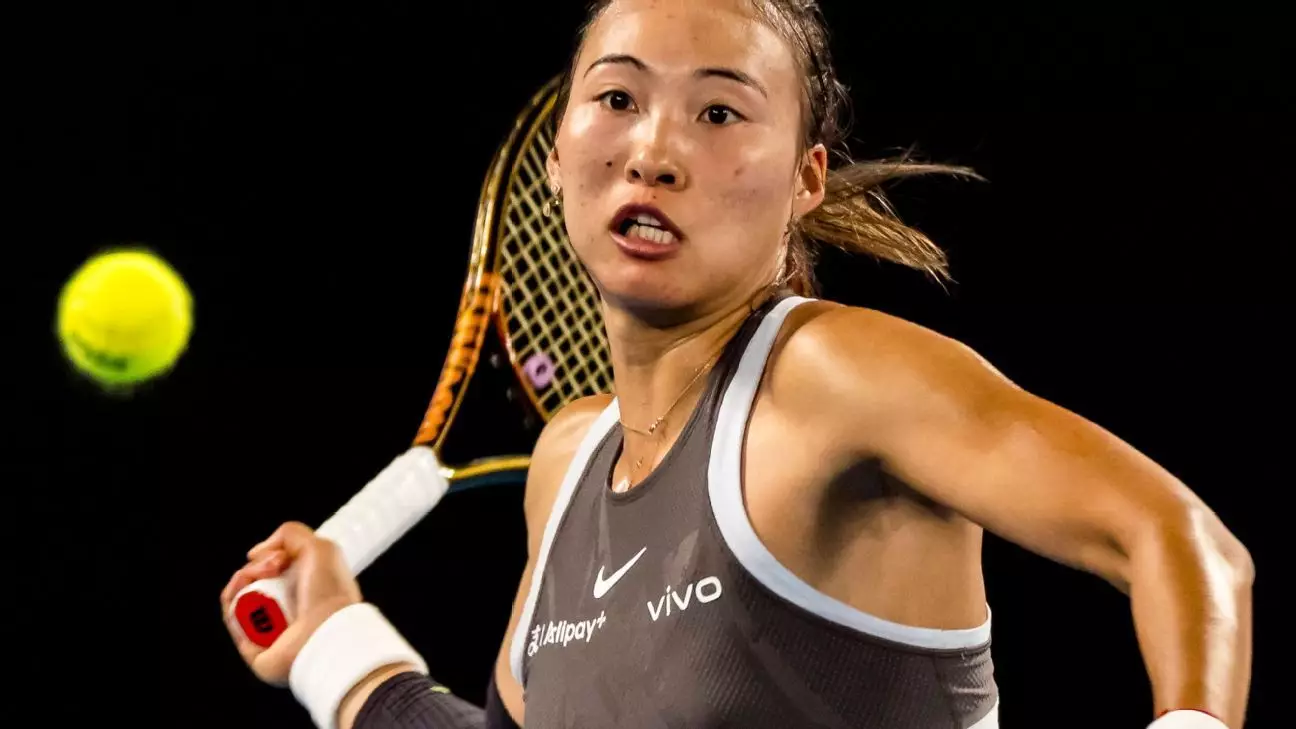Zheng Qinwen’s trajectory in the world of tennis has undergone significant transformations over the past year. From a promising contender to a formidable player, her evolution is underscored by remarkable achievements, including a runner-up finish at the previous year’s Australian Open and an Olympic gold medal representing China. Despite these remarkable accomplishments, as she entered Rod Laver Arena on Sunday, nerves gripped her—a sentiment familiar to athletes, especially in high-stakes situations, and indicative of her ongoing journey.
The Australian Open marks the start of a new season, and for Zheng, it signifies more than just competition; it’s a symbol of her emotional connection to the sport and the venue itself. With the highs of her recent accolades still fresh in her mind, it’s no surprise this year’s tournament elicited such profound feelings. Her victory against Anca Todoni in the first round—7-6 (3), 6-1—was a testament to her resilience, particularly since the match unfolded amidst tempestuous weather conditions. This clash between nerves and performance is a reminder that even seasoned players face psychological hurdles, complicating the quest for perfection on the court.
Reflecting on Zheng’s rise, one must consider that her previous Australian Open journey was a stark contrast to her latest experience. A year ago, she catapulted into public consciousness as a finalist, illustrating her potential on one of tennis’s biggest stages. Competing against Aryna Sabalenka not only propelled her into the limelight, but also paved the way for greater expectations. As a No. 5 seed in this iteration, her standing reflects her advancement, yet the weight of anticipation can easily lead to trepidation.
Zheng’s performance against Todoni highlighted the intricacies of navigating those expectations. Despite nearly losing grip in the opening set, her determination shone through. Even as she faced set points against her while serving, the subsequent victory points toward her burgeoning maturity as a player. Furthermore, her ability to flourish under a closed roof, shielded from external weather disturbances, served to accentuate her comfort on indoor hard courts—a setting favorable to her imposing playing style.
The tournament commenced with a blend of seasoned champions and emerging talents vying for dominance. Double champion Aryna Sabalenka initiated her title defense with an efficient victory over Sloane Stephens, while Alexander Zverev showcased resilience. Observing the juxtaposition of both young and veteran players underscores the layered complexity of the tournament—each match a chess game, where strategy and mental fortitude reign supreme.
Moreover, standout performances from players like Kei Nishikori—as he battled back from significant match points—serve as compelling narratives not just of athletic skill but of human spirit. Likewise, the emergence of new players like Hady Habib brings a refreshing dynamic to the tournament. His historic win for Lebanon highlights the growing representation of diverse backgrounds in global tennis, further enriching the sport’s narrative tapestry.
Zheng’s realization that nerves could either hinder or enhance performance showcases an essential lesson for athletes: the importance of mental preparation. While she managed to secure victory on this occasion, she candidly admitted the jitters might have detracted from her best play. This introspective quality is crucial for growth, evidencing her awareness of her mental state as an athlete aiming for sustained success. As her career progresses, finding the equilibrium between harnessing nerves and cultivating a commanding presence on the court will be vital.
Navigating the broader landscape of the tournament, Zheng is not alone in her journey. As players across the rankings attempt to establish dominance and carve paths toward their individual goals, the collective experience of the Australian Open fosters a unique camaraderie among competitors. This shared struggle amidst personal aspirations and national pride illustrates the sport’s multifaceted nature.
As the tournament unfolds, Zheng Qinwen stands at a pivotal juncture in her career, blending past lessons with future ambitions. The Australian Open remains a crucible for talent, yet it is also a personal saga of resilience, nerves, and tenacity. Zheng’s story is far from over, and as she progresses through the rounds, every match will further shape her identity as a player and as an individual in the sport. The harmonious dance between pressure and performance will undoubtedly define her path, reaffirming her status not just as a competitor, but as an evolving symbol of the sport’s vibrant future.


Leave a Reply